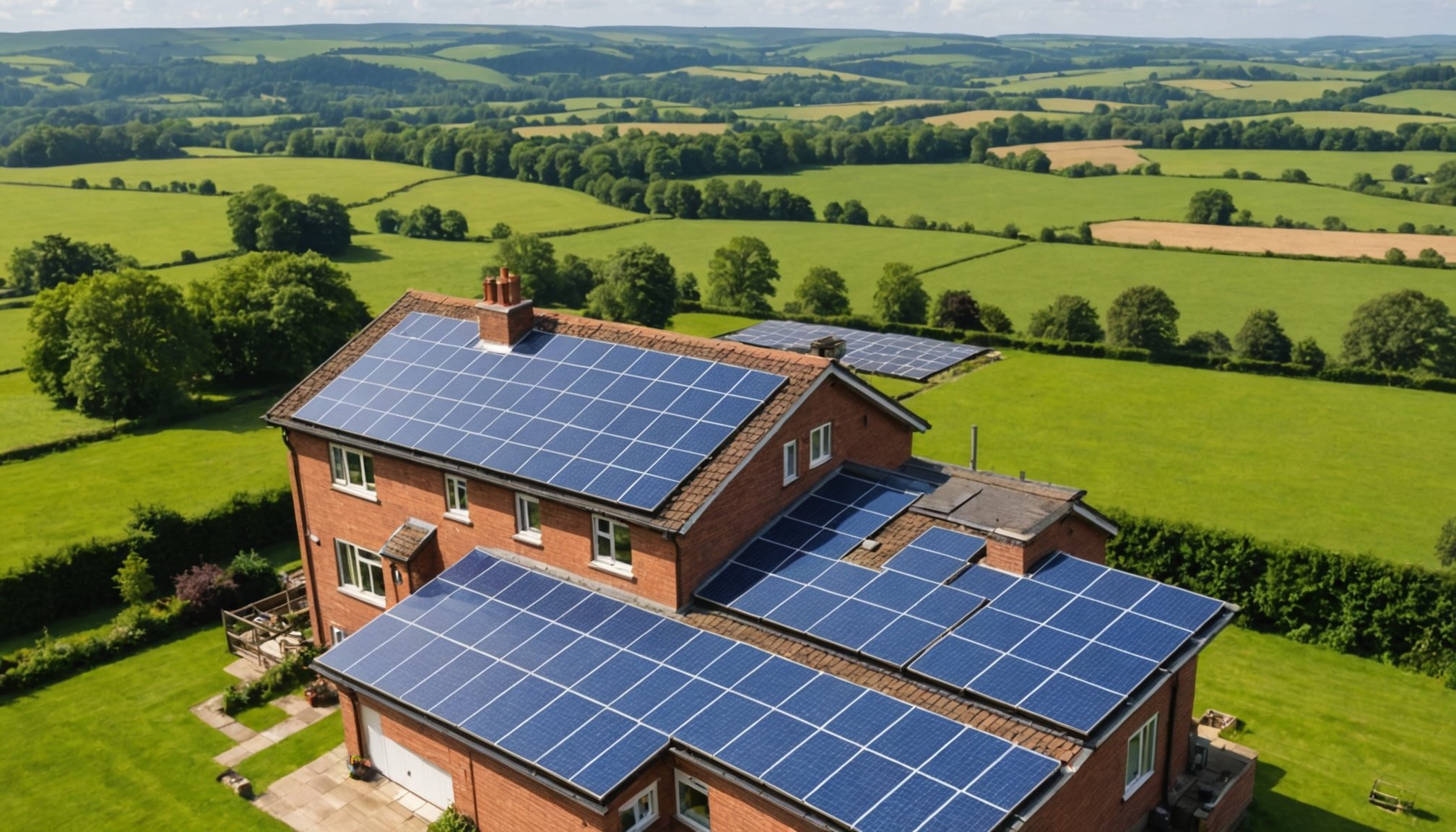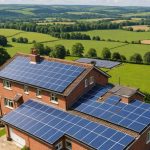Understanding Solar Panel Installations and Home Insurance Costs
In rural Yorkshire, solar panel installations are gaining traction as an effective solution for harnessing renewable energy. Solar panels, primarily photovoltaic systems, convert sunlight into electricity, reducing reliance on traditional energy sources. As these installations become increasingly popular, homeowners should consider the implications for home insurance costs.
One critical factor in home insurance costs is property valuation, which can be influenced by the presence of solar panels. While solar panels may increase property value by enhancing energy efficiency and reducing utility expenses, insurers may adjust their risk assessments accordingly. This adjustment could lead to variations in insurance premiums. It’s crucial for homeowners to consult with insurance experts to understand these potential changes.
Have you seen this : How proximity to healthcare facilities impacts london property values: an in-depth exploration
State and local regulations in rural Yorkshire play a vital role in shaping insurance policies related to solar panels. Regulations may demand specific installation standards and safety measures, impacting insurance evaluations. Compliance with these guidelines is crucial for homeowners to ensure their insurance policies provide adequate coverage.
Understanding these key aspects emphasises the importance of thorough research and consultation for those considering solar panel installations in rural Yorkshire. Engaging with experts during this process ensures informed decision-making, balancing investment benefits against potential insurance cost implications.
In the same genre : Real estate in la tania: your guide to ski-season properties
Factors Influencing Home Insurance Premiums
When considering home insurance premiums, several influencing factors come into play with solar panel installations. These installations can alter a property’s value, thereby affecting the insurance premium calculations. Insurers typically adjust premiums based on the risk assessment associated with these changes.
Property Value Implications
Higher property value often results in increased premiums. Solar panel installations can enhance the property value by improving energy efficiency and overall market appeal. However, this valuation increase needs careful documentation to reflect accurately in insurance assessments.
Risk Factors Considered by Insurers
Insurers evaluate various risk factors, such as installation quality, potential for damage, and maintenance needs. Homes with solar panels must adhere to safety standards, as non-compliance can lead to increased premiums. Insurers also consider the likelihood of damage to panels from weather or environmental hazards.
Renewable Energy Incentives
There are financial incentives encouraging solar adoption, potentially offsetting insurance premium hikes. These include grants, tax rebates, and discount schemes available for homeowners. Understanding and utilising these incentives can mitigate higher initial costs associated with premium adjustments.
Case Studies: Insurance Costs Before and After Installation
Case studies offer valuable insights into the actual effects of solar panel installations on home insurance costs. In rural Yorkshire, homeowners have shared their experiences, revealing notable trends. A study showcased homeowners who observed varying adjustments to their premiums post-installation. Some reported negligible increases, while others experienced more noticeable hikes, typically influenced by insurer-specific policies and risk assessments.
Comparative analysis indicates that the solar panel impact on insurance quotes is largely dependent on the perceived value addition and associated risks, such as potential damage from environmental factors. Commonly, insurance providers reassessed property risks and adjusted valuations accordingly.
Homeowners provide eye-opening insights regarding their experiences with different insurance providers. Those who actively engaged insurers early in the solar installation process reported smoother transitions in their insurance coverage. By facilitating communication, property owners mitigated the surprise of unexpected premium changes.
Several homeowners noted that insurers, who clearly outlined detailed policy changes associated with solar installations, garnered more trust. This proactive approach ensured coverage alignment and property valuation accuracy. Such case studies highlight the importance of comprehensive dialogue with insurance companies to anticipate potential cost adjustments.
Insurance Providers and Policies for Solar-Powered Homes
Adopting solar panels in rural Yorkshire necessitates understanding how insurance providers accommodate such installations. Many insurance companies now tailor home insurance policies to better serve solar-powered homeowners. These policies typically aim to balance comprehensive coverage with the unique needs posed by solar technology.
Top Insurance Providers in Rural Yorkshire
Several top insurers in rural Yorkshire specialise in coverage for homes with solar panels, recognising the region’s growing shift toward renewable energy. These providers are more likely to offer customised policies that align with the specific demands of solar technology.
Policy Features and Coverage Options
Home insurance policies for solar-powered homes often include features such as coverage for solar panel systems against a variety of risks like theft, vandalism, and environmental damage. Importantly, they also reflect the increased property value brought by these installations, ensuring enhanced protection overall.
Limitations and Exclusions
Despite tailored policies, some notable limitations and exclusions exist. For instance, coverage may not automatically include maintenance issues or wear and tear on the panels. It is crucial for homeowners to thoroughly review policy documents or seek advice to understand potential coverage gaps and ensure their solar installations are fully protected.
Cost Savings and Benefits of Solar Panel Installations
The installation of solar panels often leads to significant cost savings over time. For homeowners in rural Yorkshire, the appeal lies in reduced utility bills. By harnessing sunlight, these systems generate electricity, diminishing reliance on traditional energy sources and cutting energy expenditures substantially.
Solar panels enhance energy efficiency, offering a dual benefit of financial gain and positive environmental impact. Reducing carbon footprints, they contribute to a greener, more sustainable future. While initial installation costs can be high, the long-term financial analysis reveals substantial savings. Over years, homeowners find the investment yields notable returns, recovering costs through energy savings.
Incentives further sweeten the deal. Numerous financial benefits incentivize solar adoption, such as government grants, rebates, and tax credits. These initiatives lessen initial financial outlays, enabling broader adoption across communities.
Beyond the monetary aspect, additional advantages include reduced maintenance expenses and potential escalation in property valuation. Not only do solar panels boost property desirability, but they also align with eco-friendly living standards, increasingly sought by potential buyers. As energy costs rise, the transition to renewable sources offers strategic protection against fluctuating electricity prices, representing a prudent investment in future-proofing homes.
Common Concerns and Misconceptions
Navigating solar panel insurance comes with myriad misconceptions, with homeowners often concerned about potential premium increases. Contrary to popular belief, installing solar panels does not automatically spike premiums. Though some insurers may reassess risks and adjust costs, proactive engagement helps mitigate unforeseen hikes.
Misconceptions About Insurance Premium Increases
There’s a widespread belief that solar panels drastically elevate home insurance costs. However, many insurers offer competitive rates, understanding the durable and risk-mitigating aspects of modern systems. Even if premiums rise, the increase is often minimal compared to the long-term benefits of solar installations.
Understanding Policy Changes and Renewals
Homeowners worry about the complexities of policy changes and renewals post-installation. It’s crucial to review policy details and communicate with insurers to ensure solar panels are included in coverage. Regular updates help align policies with any system upgrades or replacements.
Addressing Questions on Solar System Damage
Concerns about potential solar system damage are valid, but many policies cover common threats like weather damage. Homeowners should clarify what protection their policy offers and if maintenance needs are covered. As these installations are durable, understanding coverage can ease apprehensions.











